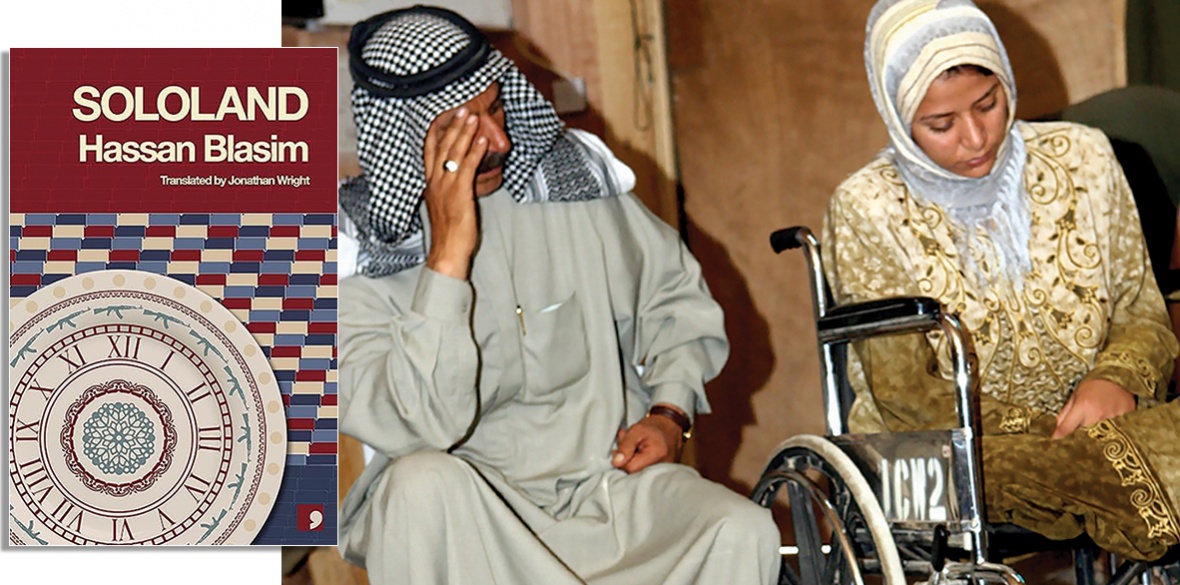This is the last article you can read this month
You can read more article this month
You can read more articles this month
Sorry your limit is up for this month
Reset on:
Please help support the Morning Star by subscribing here
Sololand
By Hassan Blasim, translated by Jonathan Wright
Comma Press £10.99
SOLOLAND by Iraqi writer Hassan Blasim is a collection of three stories focusing on Iraq’s recent violent history and its devastating consequences.
One of the most established contemporary Arabic writers being published in English, Blasim represents the starkest brutalities through satire and black humour. His long-time collaborator Jonathan Wright delivers the narratives into English idiomatic style.
The result is harrowing in places, and with an uncomfortably misogynistic authorial voice that sometimes seems to lack insight.
Elias in the land of Isis, the first story, opens with a young Yezidi boy smoking a cigarette whilst chewing on a raw onion, to avoid detection. We have entered the insane brutality of Isis control – if the boy is found to have been smoking he may lose fingers, or his life.
It is 2014. A Dominican church in Mosul has been taken over as an Isis command centre. Elias assists his mentor and protector, Abu Qatada, the centre’s cook, in a secret and dangerous mission – rescuing ancient books belonging to the Dominicans.
A black crate arrives housing an Italian hostage, caged there for a time, then taken away, never to be seen again; a female poet has been forcefully married to two competing Isis commanders – one slits the throat of the other, the poet disappears; a raped teenage girl slits her own wrists to escape her nightly tortures. Such is the killing, blood pours through the church floorboards.
Through the nihilistic horrors food serves as a reminder of life: “In the nave of the church, which Abu Qatada had turned into his kitchen, there were sacks of potatoes, aubergines, courgettes, cucumbers, onions, rice, lentils and beans...” Food and books represent hope for humanity’s return from the abyss, as Elias bears witness to the atrocities.
The second story, The Law of Sololand, begins with another first person narrative. An Iraqi refugee is subsisting as a dishwasher in “a northern” restaurant somewhere in Scandinavia.
Following news of the gang-rape by refugees of a young woman in a remote town, the narrator goes to offer his services translating for a despised community of refugees.
This story focuses on difficulties faced by Iraqi refugees in an increasingly hostile environment. It opens with a detailed range of perspectives, layering the prose with points of view from every side, highlighting bias and unfounded assumptions among the main characters.
A violent showdown erupts in a somewhat rushed plotting. The story’s ending attempts to shock but is unconvincing in the writing. This also affects the wider aim of pointing out parallels of violence across cultures.
The final story, Bulbul, gets an absurdist treatment. Bulbul is a useful idiot reminiscent of the classic The Good Soldier Svejk, by Jaroslav Hasek. Bulbul’s exploits make up a chronicle of failure in which corruption at the core of insurgency Iraq is exposed.
In the tangled factionalism of civil war, Bulbul comes under the protection of his uncle Tahir, a prominent leader in the Shi’ite militia. Tahir hands the dreamy Bulbul over to a powerful religious leader who sets Bulbul to creating fake email accounts to lure virgin girls into the sayyid’s domain.
Bulbul’s story progresses through the complex weave of hypocrisies maintaining religious elites, dominated by a despised Iran. Lurid sex scenes give way to assassination sprees. To have spoken a truth becomes a death sentence. “My god, it’s a disaster, this Iraq,” Bulbul admits.
From radio-broadcasting tall tales to launching drones against Daesh (Isis) fighters, Bulbul moves through the carnage. In one scene a little girl is left to bleed to death on a rooftop.
“What’s wrong, O Lord, with us Iraqis?” Bulbul asks. “We’re still just Sunnis, Shi’ites, Kurds, Turkomans and Christians... If ...the Sunnis sold us to Daesh, who are the Kurds going to sell us to tomorrow? And haven’t we Shi’ites sold ourselves to Iran?”
When set to writing intelligence reports on Tahir Square protesters, Bulbul finally flips allegiance. He sweet-talks a diplomatic posting to Sweden from where he claims asylum.
A muted ending is achieved as Bulbul drains a glass of wine, opens a blank webpage and types out the title of his new book: To Hell with God, the bastard.










